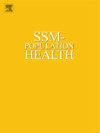A hidden cost of drinking: Alcohol use and gendered inequalities in unpaid care work
IF 3.1
2区 医学
Q1 PUBLIC, ENVIRONMENTAL & OCCUPATIONAL HEALTH
引用次数: 0
Abstract
The impact of alcohol use on families is an important, yet frequently understudied, avenue of research. Unpaid care work, which encompasses childcare, eldercare, cooking, and cleaning, and alcohol use, are both gendered. Men are more likely to consume alcohol, binge drink, and have alcohol use disorder and women do more unpaid care work in families. Given the gendered nature of both, this study aims to assess if alcohol consumption impacts the distribution of unpaid care work in families by gender. Using the Panel Study of Income Dynamics (PSID), a longitudinal dataset, this paper analyzes how alcohol use influences the husband and wife's distribution of unpaid care work. Data was analyzed using a fixed effects model with robust standard errors. The results indicate that alcohol use significantly impacts the distribution of unpaid care work in the family. Heavy drinking by the husband is associated with the wives completing an additional 10.59 hours of childcare a week and 2.120 more hours of housework a week. Heavy drinking by the wife is correlated with 2.384 fewer hours of housework. The wife's drinking behavior has a minimal effect on the husband's unpaid care burden. These results indicate that there are even higher levels of gender inequality in unpaid care work in alcohol-affected families (AAFs) which may lead to worse social, economic, and psychological outcomes for the women in those families. This further emphasizes the importance of incorporating spouses and families in interventions and policies about alcohol use.
饮酒的隐性成本:无报酬护理工作中的酒精使用和性别不平等
酒精使用对家庭的影响是一个重要的研究方向,但往往研究不足。无报酬的护理工作,包括儿童保育、老人护理、烹饪、清洁和饮酒,都是性别的。男性更有可能饮酒、狂饮和患有酒精使用障碍,而女性在家庭中承担更多的无偿护理工作。鉴于两者的性别性质,本研究旨在评估酒精消费是否会影响家庭中按性别分配的无偿护理工作。利用纵向数据集收入动态面板研究(PSID),本文分析了酒精使用如何影响丈夫和妻子的无偿护理工作分布。数据分析采用具有稳健标准误差的固定效应模型。结果表明,酒精使用显著影响无偿护理工作在家庭中的分布。如果丈夫酗酒,妻子每周要多花10.59小时照顾孩子,多花2.120小时做家务。妻子酗酒与家务劳动时间减少2.384小时相关。妻子的饮酒行为对丈夫的无薪照顾负担的影响微乎其微。这些结果表明,在受酒精影响的家庭(AAFs)中,无薪护理工作中的性别不平等程度甚至更高,这可能导致这些家庭中妇女的社会、经济和心理结果更糟。这进一步强调了将配偶和家庭纳入有关酒精使用的干预措施和政策的重要性。
本文章由计算机程序翻译,如有差异,请以英文原文为准。
求助全文
约1分钟内获得全文
求助全文
来源期刊

Ssm-Population Health
PUBLIC, ENVIRONMENTAL & OCCUPATIONAL HEALTH-
CiteScore
6.50
自引率
2.10%
发文量
298
审稿时长
101 days
期刊介绍:
SSM - Population Health. The new online only, open access, peer reviewed journal in all areas relating Social Science research to population health. SSM - Population Health shares the same Editors-in Chief and general approach to manuscripts as its sister journal, Social Science & Medicine. The journal takes a broad approach to the field especially welcoming interdisciplinary papers from across the Social Sciences and allied areas. SSM - Population Health offers an alternative outlet for work which might not be considered, or is classed as ''out of scope'' elsewhere, and prioritizes fast peer review and publication to the benefit of authors and readers. The journal welcomes all types of paper from traditional primary research articles, replication studies, short communications, methodological studies, instrument validation, opinion pieces, literature reviews, etc. SSM - Population Health also offers the opportunity to publish special issues or sections to reflect current interest and research in topical or developing areas. The journal fully supports authors wanting to present their research in an innovative fashion though the use of multimedia formats.
 求助内容:
求助内容: 应助结果提醒方式:
应助结果提醒方式:


